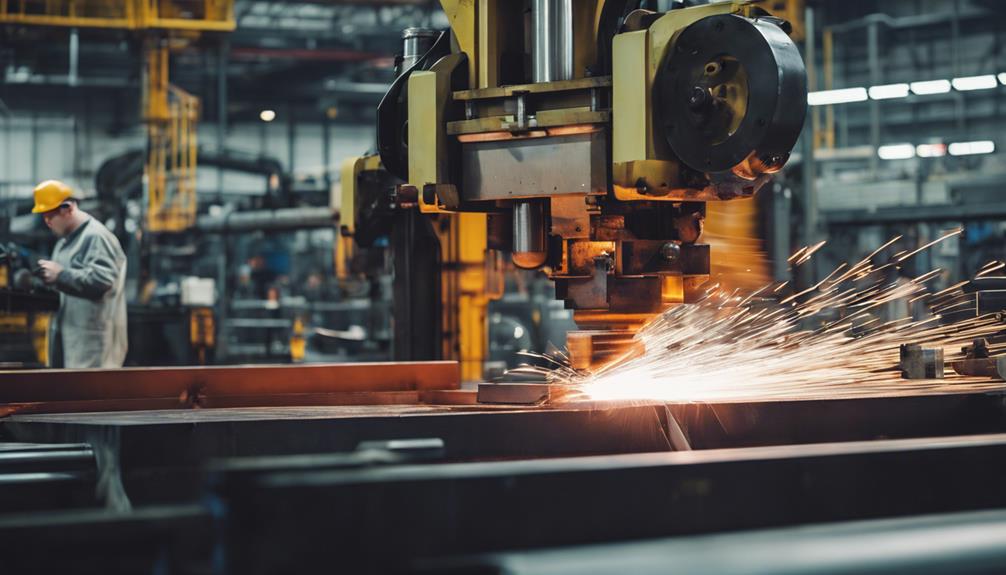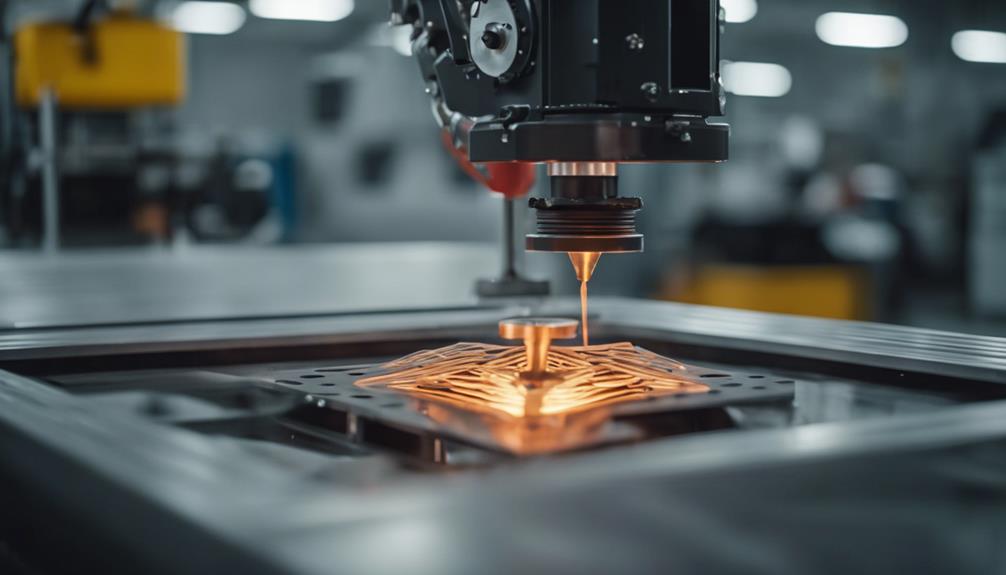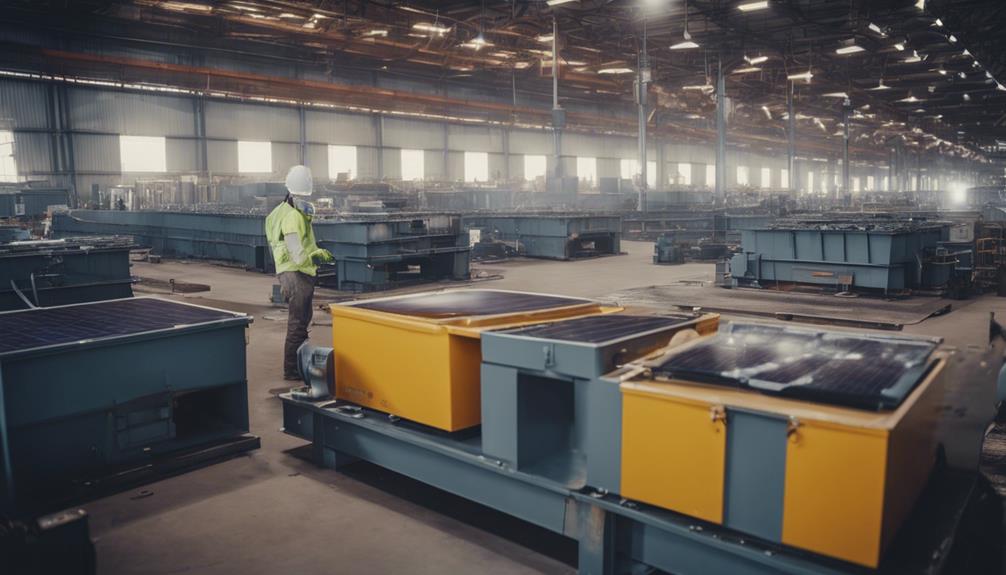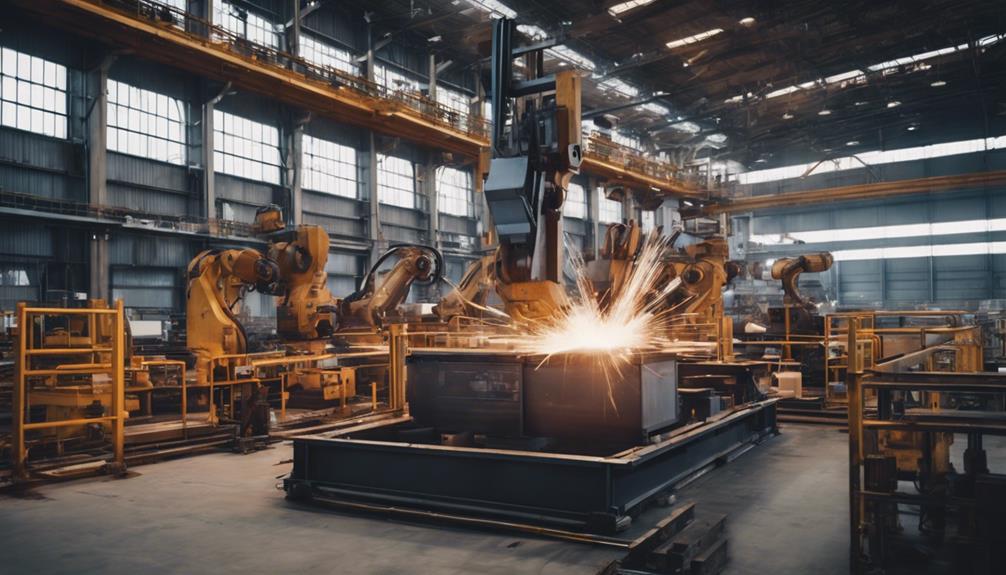Industrial steel fabrication revolutionizes the manufacturing industry with robotics and advanced technologies enhancing efficiency and precision. Automated stations optimize production, reduce human errors, and enhance productivity. Additive manufacturing enables intricate designs and customization, reducing material waste. Advanced materials elevate product performance and durability. Green practices minimize environmental impact, while digital integration leads to smarter operations with IoT and AI. This transformation in steel fabrication drives innovation, sustainability, and competitiveness in the manufacturing industry. Discover more about the cutting-edge advancements shaping the future of industrial steel fabrication.
Key Takeaways
- Robotics streamline steel fabrication processes, enhancing efficiency and precision.
- Additive manufacturing enables complex designs and reduces material waste.
- Advanced materials improve product performance and sustainability.
- Green practices in steel manufacturing promote eco-friendly methods.
- Digital integration with IoT and AI optimizes operations for increased competitiveness.
Automation in Steel Fabrication

Automation has revolutionized the steel fabrication industry by integrating robotics and advanced technologies to enhance efficiency and precision in production processes. Robotics play an essential role in steel fabrication, improving productivity and precision while reducing the occurrence of human errors in tasks such as welding, cutting, and assembling. Automated stations, including bending machines, are instrumental in optimizing production by minimizing downtime, enhancing accuracy, and increasing adaptability to different production requirements.
Moreover, the utilization of AI-guided lasers in steel fabrication has proven to be beneficial. These lasers help in reducing gas consumption, enhancing productivity levels, and contributing immensely to the overall efficiency of the manufacturing processes. The integration of smart processes in automated stations further enhances efficiency, accuracy, and safety in steel fabrication. As a result, these advancements in automation technologies are driving significant progress in the steel fabrication industry, leading to improved production processes and higher quality outputs.
Robotics and Efficiency Boost
The integration of robotics into industrial steel fabrication processes not only enhances efficiency but also drives substantial improvements in productivity and quality within the manufacturing sector.
By automating tasks such as welding, cutting, and assembling, robotics play an essential role in streamlining operations in steel fabrication. Automated processes greatly reduce production time and labor costs while ensuring precision and consistency in fabricating even the most complex steel components.
This, in turn, leads to higher productivity rates and an overall enhancement in the quality of manufactured goods. The efficiency boost brought about by robotics in steel fabrication results in increased output capacity, providing companies with a competitive edge in the industry.
As robotics continue to advance and become more sophisticated, the manufacturing sector can expect further optimization of processes, ultimately revolutionizing the way industrial steel fabrication is approached.
Additive Manufacturing Innovations

Additive manufacturing advancements in the steel fabrication industry have revolutionized the production of intricate metal components through layer-by-layer construction. Also known as 3D printing, this technology enables the creation of complex designs that were previously unattainable with traditional fabrication methods.
By utilizing additive manufacturing for metal components, manufacturers benefit from increased design flexibility and customization options. This innovative approach is particularly important for producing prototypes, tooling, and unique parts, as it reduces material waste compared to subtractive manufacturing processes.
The application of 3D printing in steel fabrication drives innovation within the sector, allowing for the development of highly detailed and customized metal products. These advancements not only enhance efficiency and speed up production but also enable the creation of intricate metal structures with unparalleled precision.
As additive manufacturing continues to evolve, it plays a significant role in shaping the future of steel fabrication processes.
Advanced Materials in Fabrication
Utilizing advanced materials in steel fabrication processes elevates product performance and durability, setting new standards for the manufacturing industry.
Industrial metal fabrication has seen a significant shift towards incorporating advanced materials such as high-strength alloys and composites. These materials offer superior corrosion resistance, increased durability, and enhanced design flexibility for innovative solutions.
By employing advanced materials in the steel fabrication process, manufacturers can guarantee longer product lifespans and create components that are both stronger and lighter. This not only reduces fuel consumption but also enhances product durability, making them ideal for various applications.
The reliable strength-to-weight ratios of these advanced materials further contribute to the efficiency, performance, and sustainability of industrial metal fabrication.
Green Practices in Steel Manufacturing

With a growing emphasis on sustainability and environmental consciousness, the steel manufacturing industry is increasingly shifting towards implementing green practices to reduce its carbon footprint and promote eco-friendly production methods.
Green practices in steel manufacturing focus on minimizing environmental impact by incorporating recycled materials and energy-efficient processes. Initiatives in steel fabrication that prioritize eco-friendliness are propelling innovation within the industry towards more sustainable practices.
Minimizing waste through precise fabrication techniques stands as a central objective in green steel manufacturing, aligning with global efforts to reduce carbon footprint and promote eco-conscious production methods. Sustainability in steel fabrication is not only an environmental necessity but also a strategic business approach to meet evolving consumer demands.
Digital Integration for Smarter Operations
Digital integration technologies such as IoT, AI, and machine learning are revolutionizing Industrial Steel Fabrication, leading to smarter and more efficient operations. By leveraging these advanced technologies, smart fabrication facilities can tap into real-time data for predictive maintenance and quality control purposes.
The integration of IoT and AI enables steel manufacturers to optimize their production processes, ensuring heightened efficiency and precision in every step of fabrication. These digital tools also contribute to making operations leaner and more responsive, ultimately enhancing the overall productivity and competitiveness of the manufacturing industry.
In a sector where precision and timeliness are paramount, the implementation of digital integration stands out as an essential factor in staying ahead. As technology continues to advance, the seamless integration of digital tools will likely become the norm rather than the exception in the domain of industrial steel fabrication.
Frequently Asked Questions
What Is the Future of the Metal Fabrication Industry?
The future of the metal fabrication industry is evolving through technology, sustainability, and innovation, with a focus on automation, advanced materials, and digital tools. These advancements enhance efficiency, durability, and environmental responsibility, shaping a dynamic and progressive industry landscape.
How Is Fabrication Related to Manufacturing?
Fabrication in manufacturing involves processes like cutting, bending, and assembling raw materials to create finished products or components. It guarantees precision and accuracy, meeting specific design requirements through stages such as design, cutting, forming, assembly, and finishing.
Is Steel Fabrication Considered Manufacturing?
Certainly, steel fabrication is unquestionably considered a pivotal aspect of the manufacturing industry. It involves the intricate process of transforming raw steel materials into finished goods through cutting, bending, and assembling, showcasing its significance in production processes.
How Is AI Changing the Metal Fabrication Industry?
Artificial Intelligence is revolutionizing the metal fabrication industry by enabling predictive maintenance, automating processes with machine learning algorithms, utilizing AI-guided lasers for efficiency, integrating robotics for productivity, and ensuring high-quality products through advanced technologies.
Conclusion
Overall, the industrial steel fabrication industry is experiencing a significant revolution through the implementation of automation, robotics, additive manufacturing, advanced materials, green practices, and digital integration.
These advancements are leading to increased efficiency, precision, and sustainability in manufacturing processes.
As technology continues to evolve, the future of steel fabrication looks promising with continued innovations driving the industry forward.

